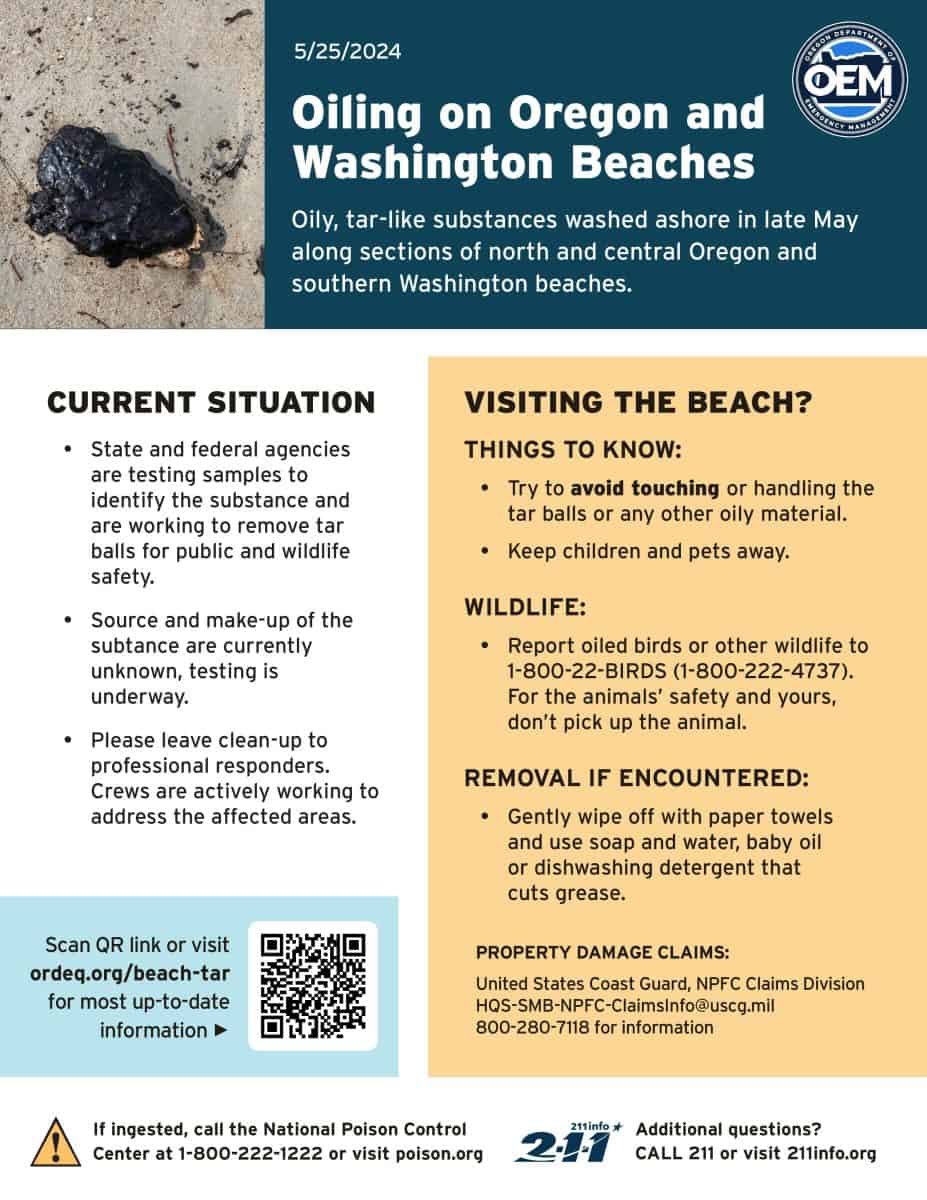Responders continue surveying and cleanup efforts for a tar-like oil washing up on shorelines and impacting wildlife since Sunday, May 19 from Long Beach, WA to south of Waldport, OR. To date, no source has been identified. However, analysis shows that the tar-like substance is petroleum based.
Shoreline Impacts
Washington: In an development from previous days, teams in Washington assessed beaches from Ocean Shores south to mouth of Grays Harbor; and Westport south to Grayland and found no evidence of oiling. Impacted areas continue to trend south, where tar balls are observed on the beaches of central and northern Oregon. Washington’s assessment teams will be out today to assess shoreline from Pacific Beach south to Copalis, and in the Seaview area.
Oregon: Yesterday OPRD Beach Rangers reported that from Netarts Spit to Cape Lookout not a lot of new tar balls were observed. There was a report of oiling at Driftwood Recreational Area near Western Snowy Plover nesting sites. Cleanup crews have been dispatched there today along with assistance from Oregon Fish and Wildlife to ensure cleanup activities have a minimal disruption of Plover behavior or habitat. We continue to see additional oiling of Oregon beaches, moving slowly south. The southernmost point we have confirmed oil detected is just south of Waldport. We have surveyed beaches in Lane County but have not found oil there yet.
Wildlife Impacts
One oiled Loon was collected yesterday near Nahcotta, WA, and one Common Murre was collected at Cannon Beach, OR.
The response is tracking a deceased whale that has washed up near Nehalem Bay State Park in Oregon. At this time, there is no indication that the whale died as a result of this incident, however biologists from the NOAA Fisheries West Coast Marine Mammal Stranding Network are enroute to assess. They will perform an initial necropsy today to look for obvious signs of death such as a strike by a vessel. They will also take samples for lab analysis. The full necropsy can take a week or more. The whale washed up near a Western Snowy Plover nesting site, which is protected critical habitat for this threatened species. If in the area, please comply with all signs and stay away from the whale and restricted areas.
Operations Update
Agencies and oil spill response organizations with trained personnel and equipment are actively working to address impacted areas. To date, more than 970 pounds of tar balls mixed with sand and beach debris have been recovered from area beaches. Responders continue to conduct aerial surveillance operations to determine the substance’s source.

General Updates
As a reminder, a response website has been set up at ordeq.org/beach-tar and a claims line has been established for those who have been financially impacted by the event (HQS-SMB-NPFC-ClaimsInfo@uscg.mil or call 1-800-280-7118).
We are asking everyone to call in reports of oil and oiled wildlife:
- Report oiled wildlife to 1-800-22-BIRDS (1-800-222-4737). Untrained handling of affected wildlife is dangerous to the animals and any individuals attempting to help.
- Report oil in the water or on shore to 1-800-OILS-911 (1-800-645-7911).


.png)